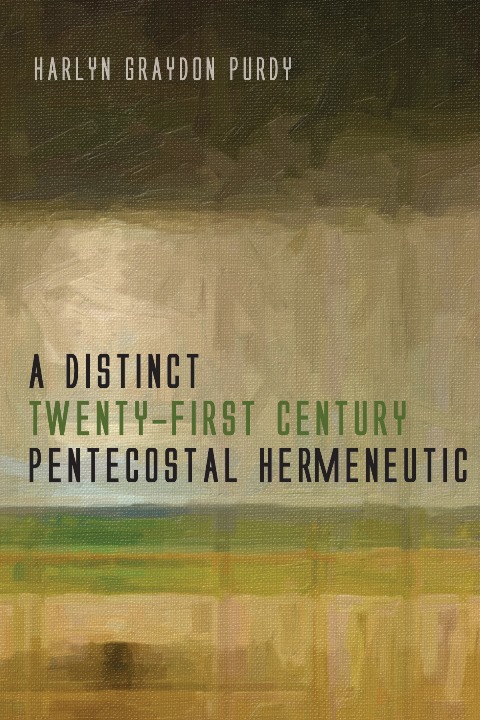Harlyn Purdy: A Distinct Twenty-First Century Pentecostal Hermeneutic
 Harlyn Graydon Purdy, A Distinct Twenty-First Century Pentecostal Hermeneutic (Eugene, OR: Wipf & Stock, 2015).
Harlyn Graydon Purdy, A Distinct Twenty-First Century Pentecostal Hermeneutic (Eugene, OR: Wipf & Stock, 2015).
In this monograph, Harlyn Graydon Purdy, President of Pentecostal Bible College in Malawi, sets forth to contribute to the ongoing discussions about Pentecostal hermeneutics. The author expresses concerns regarding trends in Pentecostalism, such as allegorization – or what he calls “unrestrained imagination” – that are mistaken for revelation from the Holy Spirit. Purdy acknowledges that such trends are common in the Majority World, including his African context. Therefore he argues that a hermeneutical structure is necessary to avoid heretical interpretations and abuses.
In chapter one, Purdy introduces his thesis and provides a literature review concerning Pentecostal hermeneutic over the last thirty years. According to Purdy, the variety of options demonstrates that the issue of hermeneutics has not been settled among Pentecostals, so developing a distinct Pentecostal hermeneutic is necessary. He writes, “Failing to do so will allow the current chaotic state to worsen and even possibly silence the Pentecostal voice completely” (18). Purdy sees a potential danger that Pentecostals will either default to an Evangelical hermeneutic or be so divided that their unique perspectives for the larger church will be lost.
In the following chapter, the author takes a historical look at Pentecostalism including its origins, Holiness influences, Revivalist impacts, and modern contributions upon it. He gives a very brief glance (about two pages) to Pentecostalism within the African context. Purdy argues that early Pentecostals used the Bible Reading method along with a Lukan lens in order to interpret scripture. He concludes that while Pentecostalism has evolved since its beginnings, many of these early influences continue to impact Pentecostal hermeneutics.
In chapter three, Purdy examines scripture to better understand the hermeneutic employed by the early Church. By studying the second and fifteenth chapters of Acts, he extrapolates that early Christians did not draw meaning from the text exclusively. Rather, meaning was developed through the interplay of scripture, the Spirit, the community, and trained leaders. The author also examines how several New Testament passages used Old Testament passages, and he deduces that “the biblical text is not static but is somewhat fluid” (73). For him, this provides precedence for a similar approach for contemporary Pentecostals.
Purdy principally extends the conversation by proposing the role of leadership within the hermeneutical process.
In chapter five, the author expands upon his proposal to apply various types of interpretive methods. He states, “A legitimate, distinct Pentecostal hermeneutic must also engage methodology that recognizes the interpreter’s involvement in the creation of meaning” (92). Purdy maintains that using a variety of approaches can both create meaning for the contemporary context while also safeguarding against extreme interpretations that are not aligned with the spirit of the text.
Category: Biblical Studies, Summer 2016


